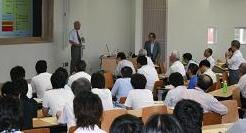Domestic Avtivities
Policy recommendations to the government
SCJ provides policymakers with its specialized and trustworthy views and advice of scientists. Recommendations issued by SCJ thus far have resulted in the implementation of various policies that include participation in Antarctic observation and the establishment of numerous important laboratories. And today, each of the SCJ committees is holding energetic discussions that lead to the announcement of the Code of Conduct for Scientists and other achievements. SCJ also promptly expresses its opinions on urgent issues available to the public in the form of the President's remarks or comments.
Our Reports(English) Our Reports(Japanese)Raising public awareness of the roles of science
SCJ holds public lectures and symposia in order to return to the public the results of scientific and academic researches.
Schedule (Japanese only)Science Cafe

Unlike conventional lectures and symposiums, science cafe is a place for a new type of communication where scientists and ordinary people talk casually with each other over a cup of coffee. In cooperation with other numerous organizations like the National Museum of Emerging Science and Innovation, SCJ held science cafe across the country from Hokkaido to Okinawa.
Schedule (Japanese only)Establishment of networks among scientists
SCJ works hand-in-hand with approximately 1,700 cooperative science and research bodies, as it also consolidates the views of researchers forming the core of Japan's scientific community in all aspects of the humanities and social sciences, and natural sciences. Moreover, SCJ organizes district conferences by dividing Japan into seven geographical blocs. These conferences seek to encourage more active collaboration with local scientists, while also contributing to promotion of academics. SCJ also holds industry-academia-government summits to promote cooperation among these three sectors.
Cooperation with science and research bodies
In accordance with the legal revision in April 2004 that abolished the system stipulating that members should have to be recommended by academic research organizations, SCJ ended the conventional registered academic research organization system. In its place, SCJ established a system of cooperative science and research bodies in October 2005 through integration with public-relations cooperative academic bodies, which help the public-relation's activities of SCJ.
SCJ is now providing information on this move to some 1,700 organizations that were registered academic research organizations and, as applications come in, designating them as cooperative science and research bodies. At present, about 1,700 cooperative bodies, including new associations, are familiarizing themselves with SCJ's activities, working to maintain and reinforce close cooperative relationships with other science and research bodies in all fields, and cooperating with public relations activities.
Activities of district conferences

SCJ organizes district conferences in seven geographical blocs-Hokkaido, Tohoku, Kanto, Chubu, Kinki, Chugoku/Shikoku, and Kyushu/Okinawa-to foster communication among local scientists and promote the advancement of academics at the local level. These conferences, which are comprised of members and associate members working or living in the relevant regions, formulate project plans for each fiscal year, plan and prepare academic lecture meetings and then take action toward their implementation, and issue district conference news.
Roughly twice a year, each district conference establishes academic lecture meetings on themes that are matched to local requirements, and invites members of the general public to participate. Also twice a year, each conference holds" informal discussions with scientistsh to familiarize regional scientists with the activities of SCJ and to serve as a place where scientists can hear the views of their colleagues in other regions.









